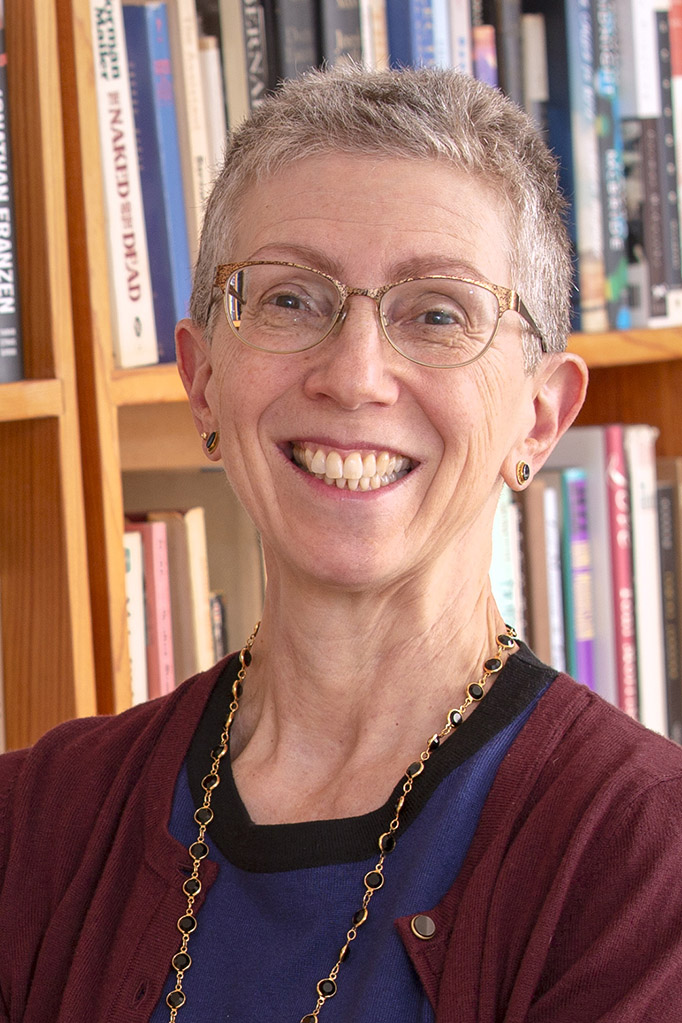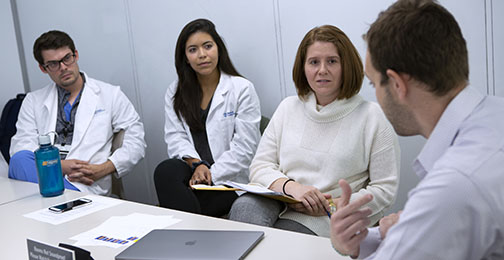|
|
Department of Humanities Newsletter Sept. 2021 issue
|
|
|
|
|
|
|

|
|
Professor and Chair, Department of Humanities
|
Professor, Public Health Sciences
Penn State College of Medicine
|
|
Edward S. Diggs Professor Emerita, Virginia Tech
|
|
Department Chair's Message
|
Welcome to the first edition of the Humanities Department Newsletter.
|
As I write this message in early August, I am mindful that we are now 18 months into the COVID-19 pandemic. We have started the 2021-2022 academic year, masked and still largely on Zoom, awaiting the impact of the Delta variant. For a little while this spring it felt that the pandemic was lifting. The virus, apparently, had other plans.
|
|
As a child I grew up with the futuristic notion of video communication by watching "The Jetsons" and "Star Trek." While computers and smart phones made Facetime and Skype a reality years ago, not until the pandemic did many of us communicate more online than in person. It has been a sobering, and yet creative, transition. We have met some limits (Zoom fatigue) at the same time that we have reveled in new-found connectivity. Local events suddenly became global. We “shared space” with people around the world. Our lives thus expanded even as they contracted.
|
|
|
|
Like a lot of you, I have been reading my way through the year—part escapism, part connecting to others, part trying to understand the pandemic and the racism that George Floyd’s murder illuminated. This year, the department purchased “Biased: Uncovering the Hidden Prejudice that Shapes What We See, Think, and Do,” by Jennifer L. Eberhardt, for all incoming medical students and the facilitators in our new course, Foundations of Health Humanities (see Education Update). The book provides a balanced, well-researched, narrative account of how culture and our brains work together to perpetuate racist behavior. Our hope is that it invites conversations in and out of the classroom about how bias works and what to do about it when it surfaces in our lives.
|
|
Our experiences of the year have been uneven—some of us have suffered intense losses; some of us have schooled our children at home; some of us have developed new passions; some of us have been lonely; some of us have learned painful personal lessons. This fall, as we come back together, at least some of the time, let us celebrate being together once again—at least outside, possibly masked and perhaps only briefly.
|
|
|
|
|
|
Education Update
|

|
In July 2021, the College of Medicine rolled out a new Phase 1 curriculum in Health Humanities for the incoming class of first-year students. Developed over the course of academic year 2020-21, the new first-year curriculum consists of three courses: Foundations of Health Humanities, Observation and Interpretation, and Humanities in Context.
|
The new courses amplify students’ understanding of the cultural contexts of health care and what it means to treat patients as whole persons, offering them an opportunity to develop and practice visual thinking skills, narrative competence, critical consciousness, critical thinking, and ethical sensitivity. With a new focus on social justice and advocacy, the courses create space for acknowledging, learning about, and disrupting racism and other forms of discrimination in health care and society at large.
|
A team of dedicated faculty and students met weekly for a year to develop a vision and learning goals for the new curriculum.
|
Vision: Health Humanities is intrinsic to medical education, developing capacities to approach patients as whole persons. Health Humanities learning experiences cultivate knowledge for practice and critical engagement, focusing on content, skills, and behaviors that advance humanism in medicine and society.
|
|
Humanities Curricular Goals
|
|
|
|
- Demonstrate cultural humility
- Demonstrate critical habits of mind
- Demonstrate cognitive and affective integration
|
- Demonstrate professional and ethical behavior
- Communicate effectively in interpersonal encounters
- Develop a humanistic professional identity
|
|
|
|
|
Book Club: Connecting Through Literature
|

|
Monthly Book Club to Feature Writers of Color
|
During academic year 2021-2022, faculty in the Department of Humanities and Harrell Library will lead discussions on literature by contemporary writers of color. Monthly meetings of the book club will be Wednesdays noon-1 p.m. on Zoom.
|
The first meeting is scheduled for Sept. 15 and features Edwidge Danticot’s memoir, Brother I’m Dying. Born in Haiti, Danticot was raised by her uncle after her parents emigrated to the U.S. for work and safety.
|
Continuing education credits are available to staff and faculty from both Penn State Health and the College of Medicine.
|
|
|
|
|
|
Research Roundup
|

|
Dr. Daniel George explains how financial instability, lack of infrastructure, a deteriorating sense of community and family fragmentation are contributing to diseases of despair in Pennsylvania communities.
|
|
|
|
|
|
|
|
Ethics Corner
|
Humanities Department Faculty Lead Penn State Health’s
COVID Ethics Task Force
|
In the early weeks of the pandemic, health systems across the country wrestled with how to allocate scarce resources, such as deciding which patients in respiratory failure should receive ventilator support if the supply of ventilators was not sufficient.
|
In addition to guidelines for the allocation of scarce resources, the group addressed whether or if the medical center could decline patient transfers from other institutions and when Penn State Health employees could be recused from interacting with COVID-infected patients, among other pressing ethical issues during the pandemic.
|
|
|
|
|
|
|
|
Ripple Effect Competition 2021-2022
|
|
|
Motivated by the racial reckoning of summer 2020, the Doctors Kienle Center for Humanistic Medicine launched the Ripple Effect Competition to support actions, programs or projects that meaningfully improve the experience of racially and ethnically diverse coworkers, patients and learners.
|
The following units have received Ripple Effect awards: the Child Life Program; the Simulation Center and Department of Anesthesiology; Departments of Psychiatry and Behavioral Health, Surgery, Family and Community Medicine and Medicine; and the Penn State Health Cancer Institute.
|
|
|
|
|
|
Breast Cancer Inside Out: Bodies, Biographies & Beliefs, by Kimberly R. Myers
|
|
Three years ago, Kimberly R. Myers, MA, PhD, professor of Humanities and Medicine, assembled a network of colleagues and patients across the U.S. and the UK to create a comprehensive exploration of, and companion for, the lived experience of breast cancer. The vision for this project was to provide academics, practitioners, patients and families—indeed, anyone interested in breast cancer—a convenient way to access a wealth of the information all in a single book. The result of this collaboration, Breast Cancer Inside Out: Bodies, Biographies & Beliefs, was published by Peter Lang Oxford in 2021.
|
|
|
|
|
|
New book by Daniel R. George, PhD, associate professor of Humanities and Public Health Sciences, suggests new approach for prevention of dementia
|
|
|
|
In American Dementia: Brain Health in an Unhealthy Society, Daniel R. George argues that policies reducing inequality and providing widespread access to education and health care may support better brain health. George, an associate professor of Humanities, and co-author Peter Whitehouse, a neurologist at Case Western Reserve University, join an emerging international consensus in arguing that decline in dementia cases has followed from policies enacted in the mid-20th century that resulted in cleaner air, soil and water, not from biomedical breakthroughs.
|
American Dementia, George's second book, is being published by Johns Hopkins University Press and will be available in September.
|
|
|
|
|
|
|
|
|
|
Monica Manglani, MD/PhD student, receives the 2021 Dellasega Community Outreach Award in recognition of her dedication and contributions to addressing community needs.
|
|
|
|
|
|
|
|
Honorifics
|
|
Gold Humanism Honor Society, a national honor society, recognizes senior medical students, residents, physicians and nurses who practice patient-centered and compassionate care.
|
|

|
|
The 2022 medical student inductees are:
|
|
Top Row, (left to right):
|
|
Brittany Ammerman, Blake Baer, Kaleb Bogale, Tyler Bruinsma, Melissa Chima, Elias Harkins, Fredrick Heitjan, Brittainy Hereford, Amy Hoffman
|
Bottom Row (left to right):
Emily Leboffe, Daniela Medina, Prisca Obidke, Banan Otaibi, Melanie Patterson, Marisa Riley
|
Pratiti Roy, Catherine Seeger, Natasha Sood
|
|
2021-22 Resident inductees:
|
|
Mark Dunleavy, MD, Department of Orthpaedics and Rehabilitation
|
|
Puja Patel, MD, Department of internal Medicine
|
|
Ibrahim Yaghnam, MD, Department of Medicine
|
Danielle Smith, MD, Department of Pediatrics
|
K. Danner Clouser Student Research Endowment provides financial assistance to medical students while engaged in a research project within the field of medical humanities. This year’s recipient are: Stephanie Golub, MS3, Kate Levenberg, MS4, Hauroi Sun, MS3 and Zahra Zhu, MS3.
|
|
Thomas V. N. Ballantine Endowment supports medical students’ art projects—visual arts, performance, creative literature—that benefit the entire community. This spring, grants were awarded to: Andrea Lin, MS2; Haorui Sun, MS3; and Valerie Urban, MS3.
|
|
|
|

|
Jungeun “Jasmine” Lee, Class of 2023, was selected for the Kienle Humanitarian Award for Third-Year Medical Students.
|
Alicia Greene, DO, resident in General Surgery in the Department of Surgery, who was awarded the 2021 Mary Louise Witmer Jones Resident Humanitarian Award.
|
|
Sandra Franz, RN, an inpatient medical surgical float pool nurse, who received the Nurse’s Humanitarian Award in Honor of Lawrence F. Kienle, MD.
|
|
|
|
|
|
Center Stage Arts in Health
|
|
|
|
|
|
The Hampden Art Committee researched what types of art would be most pleasing to patients and hand-picked some 400 pieces of art for the new Penn State Health Hampden Medical Center.
|
|
|
|
|
|
|
Book Club: Connecting Through Literature, discussions
|
|
Sept. 15, 2021, Oct. 13, 2021, Nov. 10, 2021 and Dec. 15, 2021. CE credits available.
|
|
The Doctors Kienle Center for Humanistic Medicine Annual Meeting
|
|
Sept. 23, 2021 • 4:30 p.m. • Event Tent outside the Rotunda Café
|
|
Grand Rounds Lecture: HumIn Focus documentary, “Rethinking Care,” and discussion
|
|
Charles Briggs and folklore roundtable
|
Oct. 19, 2021 • 7-9 p.m. “Cultural Health: A Forum on Folk Medical Systems” with Penn State University Harrisburg Center for Folklore Studies, CE credits are available. Visit our website for updated information.
|
Grand Rounds Lecture: Improv4Health Professionals: The Science of Teaching the Art of Medicine, Dec. 8, 2021 • noon-1:15 p.m. with an interactive workshop held in Jan. 2022
|
|
|
|
|
|
|